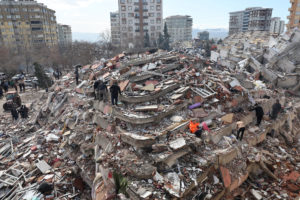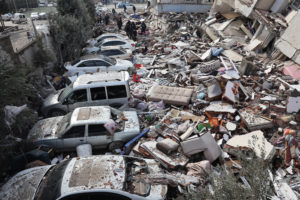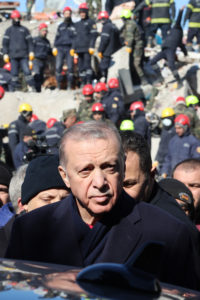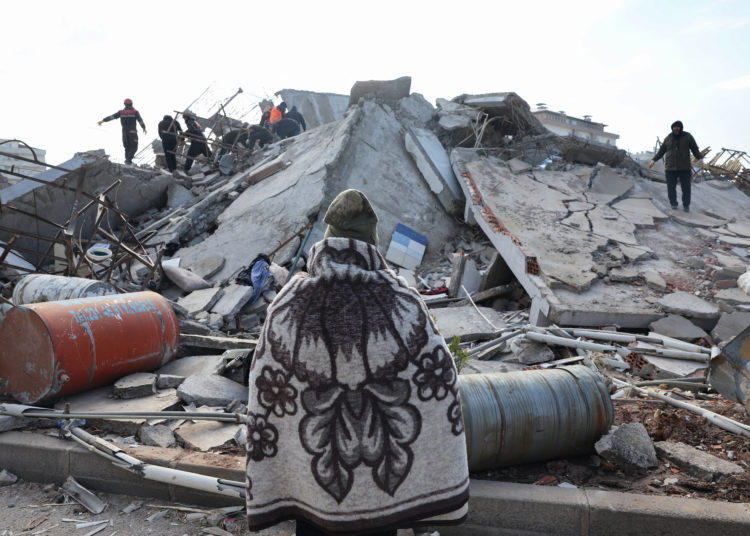Abdullah Bozkurt/Stockholm
The large-scale destruction of property and huge number of casualties in Turkey’s massive earthquakes earlier this week have exposed decades of mismanagement, nepotism and waste of funds and resources in the governance of Turkey under the corrupt regime of President Recep Tayyip Erdoğan.
The two powerful quakes, 7.7 and 7.6 magnitude according to Turkish authorities, with epicenters in the Pazarcık and Elbistan districts of the southeastern province of Kahramanmaraş, struck on Monday an area of some 110,000 square kilometers spanning 10 provinces with 13.5 million residents. According to the official tally, 20,318 people were killed and 91,511 were injured. The shortcomings in quake preparedness and major failures in responding to disasters within the critical 48-hour timeframe caused outrage and fury towards the government.
Erdoğan first came to power in 2002, propelled by two devastating earthquakes that killed about 18,000 people and injured some 50,000 in northwestern Turkey in 1999, with a promise to address corruption in the government and bolster earthquake preparedness in the country, much of which lies atop the active North Anatolian Fault.
The majority of the deaths in 1999 occurred because buildings were constructed in violation of building codes, the contractors skimped on quality in building materials for reasons of profit and public inspectors overlooked these violations for bribes and kickbacks. Erdoğan had campaigned to put a stop to these practices. He managed to sway many frustrated voters, who punished the coalition parties that were governing Turkey at the time and cast their votes for Erdogan’s newly established Justice and Development Party (AKP).
In his two-decade rule, however, Erdoğan has only made it worse and failed to take necessary steps to prepare Turkey — a country that experiences hundreds of tremors every year registering higher than 4 on the Richter scale — for the more powerful earthquakes that have been predicted by experts.

Compounding the matter further the government, in much-criticized urban development projects across the country, often ignored warnings of environmental impact and allowed the construction of lucrative residential and commercial projects in open spaces that were designated venues for people to assemble in the event of natural disasters such as earthquakes.
Shopping malls and luxury housing were built in many of the areas designated as emergency assembly points in İstanbul following the devastating earthquake in 1999. By 2015 the Erdoğan government had opened more than half of the 480 areas in İstanbul listed as assembly zones to construction of commercial and residential complexes. Other cities followed suit under the guidance and direction of the Erdoğan government.
In return Erdoğan, his family and his cronies in political and business establishments pocketed huge sums at the expense of the safety of citizens. The construction industry and government regulatory bodies have been largely complicit in the building of substandard housing for decades.
Builders and investors have managed to bribe officials from both the central government and local municipalities to allow them to ignore specifications for earthquake prevention. To maximize profits, they added more floors to the high-rise concrete buildings that have become the hallmark of Turkey’s urban landscape, increasing structural vulnerability and the possibility of compromise in the event of an earthquake.
To the grieving family member of a quake victim, the Turkish president blamed fate for the powerful earthquakes that struck Turkey:
Earthquake drills and inspections, periodically required by law, have been nothing but window dressing and served to check the box in preparedness documents filed away on the dusty shelves of government office buildings. In fact, the cities that were badly hit in the recent quakes had held such drills weeks before the disaster. The fact that 6,444 buildings collapsed in the tremors according to official records tells the tale of how ineffective these drills and inspections were.
The poor performance of the Disaster and Emergency Management Directorate (AFAD), the leading government institution that is supposed to prepare the nation for disasters and mobilize resources to respond when they occur, has also revealed major shortcomings in contingency planning, coordination and effective use of national resources in emergencies.
The Erdoğan government, notorious for its nepotism, filled all public institutions, including AFAD, with partisans based on party loyalty and ideology rather than merit. For example, AFAD’s point man, İsmail Palakoğlu, the general manager of the Disaster Response Department, which is in charge of mobilizing people and resources when a quake strikes, has no experience whatsoever in emergency management or in the field of first responders. Educated in theology, he had long worked for Turkey’s religious directorate, the Diyanet, and its affiliate Diyanet Foundation in positions that have nothing to do with disaster management. He was parachuted by Erdoğan into a key position in AFAD on March 15, 2018. He has been noticeably absent at press briefings held by AFAD to inform the public on post-quake developments.
The failure in coordination of first responders, the disorganized and often insufficient search and rescue efforts and a huge shortage of temporary shelters, food, water, heating and sanitation have laid bare the bitter fact that the government has done nothing but window dressing in terms of disaster preparedness. Most of the 268 recommendations adopted by a parliamentary investigation committee established to probe shortcomings in earthquake preparedness were not fulfilled by the Erdoğan government. Parliamentary questions submitted by opposition lawmakers in this regard were often ignored by the government.

The latest report prepared by experts at AFAD in the aftermath of a magnitude-5.9 earthquake in the Gölyaka district of Düzce province on November 23, 2022 has some shocking details regarding disaster management and preparedness. In the report AFAD experts admitted failures in responding to the quake, which claimed no deaths but injured 96 people. The key takeaways from the report include a lack of coordination, a lack of monitoring of teams and personnel assigned to the area, incorrect designation of assembly points, belated delivery of aid and personnel and a shortage of technical teams to assess damage.
The problems highlighted in the report, which was written only two-and-a-half months before the devastating quakes earlier this week, were never addressed by the government and instead were swept under the rug.
The impunity afforded those contractors who used shoddy construction techniques and materials has been a hallmark of the Erdoğan government as well. Most of those who were charged with crimes of negligence for ignoring building codes and involuntary manslaughter in the 1999 earthquakes escaped punishment under the rule of the Erdoğan government. In February 2007 the Erdoğan government simply allowed the statute of limitations expire in all ongoing cases that were filed in 1999, letting all those notorious contractors off the hook.
Those who were charged with similar negligence and related criminal offenses in violating building codes and putting public safety at risk were also protected by the government. In 2013 the Sakarya Chief Public Prosecutor’s Office indicted dozens of people including local mayor Ahmet Soğuk on charges of fraud, bribery and forgery in connection to permits issued for substandard buildings.
The police investigation had revealed that a group of people comprising building inspectors, contractors, university academics and a cement producer conspired to falsify reports for buildings that violated codes on earthquake resistance standards. The group helped obtain certificates for buildings that posed a serious risk of collapse in an earthquake by using bribery, coercion and other methods.
The case was finalized in 2018 with the acquittal of the mayor and dozens of suspects due to the interference of the AKP government, which protected the local mayor, a member of the same ruling party. Instead, the police who uncovered the fraud and referred the case to the prosecutor’s office were punished and purged from law enforcement. Police chiefs Ahmet Yaz and Mehmet Dikbaş, who exposed the network when they were working in the intelligence section of the Sakarya Police Department, were later charged with illegal wiretapping even though the wiretaps were authorized by a court and conducted in line with the law.
Some of the buildings that collapsed in Monday’s earthquakes turned out to have been constructed by companies that are very close to the ruling AKP., multiple reports stated.
The government has also failed to invest a huge fund collected under the popular name of “earthquake tax” — a tax adopted under the Democratic Left Party (DSP) government after the disastrous 1999 earthquakes. The government was not forthcoming on how to spend these funds, totaling some 88 billion Turkish lira, as of last year, and left parliamentary questions on the fate of the funds unanswered.
On occasion Erdoğan managed to sell his urban projects under the disguise of battling substandard buildings in city centers when he was in fact aiming to enrich his cronies with huge profits. In 2015, when he unveiled his TL 400 billion urban renewal plan geared toward replacing disaster-prone buildings with housing equipped to withstand a major earthquake, it was quickly revealed that he had primarily targeted profitable districts of İstanbul for the benefit of contractors close to the ruling AKP.
Following a devastating 2011 earthquake that resulted in 604 deaths in the eastern province of Van, then-prime minister Erdoğan and his party announced that 10 million buildings would be demolished and replaced with earthquake-resistant structures within 10 years. The project began in İstanbul, where a law designating neighborhoods as disaster risk areas enables municipal authorities to demolish buildings even if the owner refuses to give consent.

This law has been blasted for enabling contractors close to the AKP to benefit from city-mandated demolition projects. Such projects in İstanbul have also raised doubts, as the most vulnerable areas have not seen any attention while less risky areas in advantageous locations have experienced heavy activity. According to figures provided by the Istanbul Municipality, 190,000 buildings were expected to be destroyed in the most optimistic scenario in the event of an earthquake in the city, which has some 1.5 million buildings.
The Erdoğan government has also passed multiple amnesty laws in parliament under the title of İmar affı, granting occupancy permits for buildings that were constructed without the necessary permits and which violated building codes. Under the 2018 bill, endorsed and signed into law by Erdoğan, all buildings in Turkey that were constructed before December 31, 2017 were automatically granted occupancy permits in total disregard of safety measures and regardless of whether these buildings complied with building codes.
In fact Erdoğan’s party has recently submitted a new bill to parliament to offer another amnesty for buildings that were constructed without permits or authorization. If the earthquake hadn’t happened, parliament was expected to debate the bill and pass it with the majority vote of Erdoğan’s AKP and its allies.
The earthquakes in 10 provinces on Monday also raised concerns about nuclear safety since the Akkuyu nuclear power plant, under construction by Russia’s Rosatom in Mersin since 2018, is in close proximity to the earthquake zone. Critics oppose the construction on the grounds that safety and environmental impact reports, required for the permitting of plant construction and operation, were approved in a rush by the Erdoğan government.
On February 6 Russian news agencies carried reports saying that no damage was sustained at the plant due to the earthquakes and aftershocks and that the work is continuing as planned on the site. On the same day, the International Atomic Energy Agency also stated that there was no impact from the earthquakes on nuclear safety and security in Turkey, citing communications with Turkey’s Nuclear Regulatory Authority.












